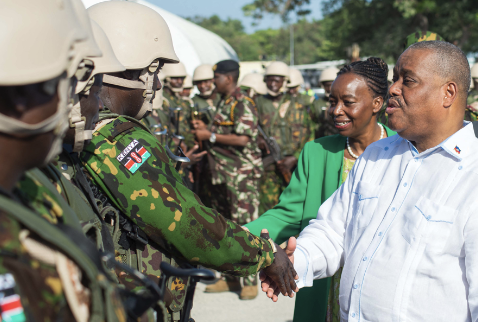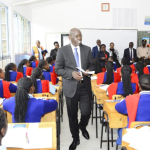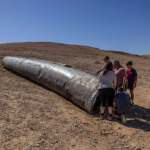Haitian Prime Minister Garry Conille began a trip to the United Arab Emirates and Kenya on Saturday to seek security assistance following one of the deadliest gang attacks in recent years. In Kenya, Conille is scheduled to meet President William Ruto to discuss expediting the deployment of more police officers to Haiti to assist in combating gang violence.
“One of the aims of this trip is to go to Kenya to discuss with President Ruto how we can speed up the deployment of remnants of the Kenyan troops as quickly as possible to continue supporting the national police force,” Conille stated. Kenya plans to send 600 additional police officers to Haiti between this month and January. These officers have already completed their training in preparation for the deployment.
In the United Arab Emirates, Conille intends to discuss strategies for establishing regular support for the Haitian national police in their fight against crime. Haiti is currently facing a severe crisis after members of the Gran Grif gang attacked the town of Pont-Sonde in the western Artibonite region on Thursday, October 3, resulting in the deaths of at least 70 people, including infants, and displacing over 6,000 residents.
The massacre has sent shockwaves through a nation accustomed to violence, where the national police force struggles with inadequate resources and personnel. Conille, accompanied by heavily armed police, visited a hospital on Friday to meet with patients injured in the attack and promised that reinforcements were en route from the capital, Port-au-Prince.
“As you can see, we are being attacked on several fronts,” Conille said during a press conference prior to his trip.
Last week, the U.N. Security Council authorized an international security force for another year to assist local police in combating gangs and restoring law and order. However, progress has been slow, with only about 400 mostly Kenyan police officers currently deployed in Haiti.
According to security analysts, Gran Grif is the largest gang in Haiti’s Artibonite department, which is critical for the country’s rice production. The gang’s leader, Luckson Elan, claimed the attack was a retaliation against civilians for their perceived passivity while police and vigilante groups targeted his members.
This week’s killings mark a troubling escalation in the ongoing conflict in Haiti, where armed gangs dominate much of Port-au-Prince and are spreading into surrounding areas, exacerbating hunger and displacing hundreds of thousands. Despite promises of international assistance, support remains inadequate, and neighboring countries have continued to deport migrants back to Haiti.
The number of people internally displaced by the violence has surged past 700,000, nearly doubling in just six months. In response to the apparent massacre northwest of Port-au-Prince that the United Nations reported left at least 70 dead, the Haitian government deployed specialist anti-gang police units on Friday.
The attack occurred early Thursday in the town of Pont Sonde, approximately 100 kilometers (60 miles) from the capital, where gang members not only opened fire but also set ablaze numerous homes and vehicles. This incident represents the deadliest single attack since the Multinational Security Support (MSS) mission aimed at restoring peace in Haiti was launched in June 2024.
In a statement, the Haitian Prime Minister’s office condemned “this latest act of violence, targeting innocent civilians,” emphasizing that it demands “an urgent, rigorous, and coordinated response from the state.” According to the UN, at least 16 individuals were seriously injured, including two gang members shot by the police. Reports indicate that gang members set fire to at least 45 houses and 34 vehicles, prompting many residents to flee.
Additional security forces, bolstered by the Kenyan-led international policing mission, were dispatched to Pont Sonde overnight from Thursday to Friday, as stated by the prime minister’s office. Last week, the UN human rights office reported that over 3,600 people had already been killed this year due to “senseless” gang violence.
Haiti has long faced a confluence of political, humanitarian, and gang crises, with armed groups rising to power and pushing out former Prime Minister Ariel Henry earlier this year, leading to attacks on both the international airport and police stations. Many politicians have ties to these armed groups.
In a related development, the US Treasury announced sanctions against a member of parliament from the Artibonite Department, where Pont Sonde is located, for allegedly aiding the formation of the Gran Grif gang to support his election campaign in 2016. The current government is tasked with restoring security and guiding the country toward its first elections since 2016. However, the MSS mission aimed at restoring peace in Haiti is encountering setbacks due to a lack of sufficient financial support from member states that pledged assistance to the United Nations.
In his tour of Port-au-Prince on September, 21, President William Ruto to the Kenya-led MSS mission being converted to a full U.N. peacekeeping operation.
“On the suggestion to transit this into a fully U.N. Peacekeeping mission, we have absolutely no problem with it, if that is the direction the U.N. security council wants to take,” Ruto said.
The UN-authorised mission that is led by Kenya faces a funding inadequacy as member states who committed to contribute $ 84 million (Sh10.8 billion) have so far contributed $67 million (Sh8.6 billion).



